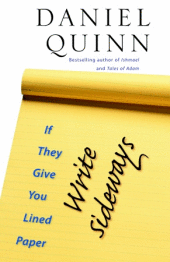Daniel Quinn died over a year ago, but it doesn't feel too late to offer up some remembrances and tributes to the many ways he made a difference in my life, and the lives of so many others.
Quinn's novel Ishmael, and the lifetime of study, contemplation, research and thinking that led up to it, is at the center of his impact, at least for me. In critically examining the most fundamental stories our culture tells itself about our origins, our purpose and our place in the world, Ishmael and subsequent books from Quinn provided a new framework of understanding and exploration about how human society works, and could work.
It would be over-simplifying to say that it is a novel about environmentalism and sustainability, or uncovering cultural biases, or problematic religious traditions, or human potential and selfishness, although it is deeply about all of those things. For me personally, reading it was a ground-shaking event in my college years, both because it named feelings, experiences, certainties and doubts I already had inside me, and then introduced a slew of new ones that I had to work through. That I am probably still working through. Whereas some novels have to invent a plot device that provides a dramatic twist at the end -- the ancient secret society DOES exist and the magical stone was hidden behind the painting all along! -- in Ishmael all of the secrets that are uncovered are real, buried in our cultural history and traditions, and the implications for revealing them are far reaching in how we live our lives.
As a person, Quinn was not a pushy evangelist for his ideas, nor did have a neatly packaged solution to offer up for the many challenges his books highlighted. Yes, he spent a lifetime trying (along with his wife Rennie) to make his ideas more clear, more accessible, more actionable through giving lectures, engaging with his readers and their questions, traveling to events and facilitating connections between those who were inspired by his work. But he wasn't selling, he wasn't anybody's savior, and his emphasis was always on improving our thinking and what might come from that.
I do not claim to have known Dan very well, but every time I talked with him or saw him in person, I experienced him as a grounded, authentic, kind, and intensely intelligent person. He had a contemplative nature, and I always appreciated that when asked a question about his work or his ideas, he would listen carefully and then pause for as long as he needed to provide a thoughtful, intentional answer. If he didn't know or couldn't form a useful response, he just said so. He was keenly aware of the power of words to persuade, convince, change minds and alter the course of history, and so he also seemed wary of uttering something that could be misinterpreted, re-appropriated or used to stuff his very not-mainstream ways of thinking into a comfortable mainstream box. He didn't have much patience for people who weren't trying to think for themselves or learn from past mistakes.
Because of the power of his books, many people wanted Dan to be their leader: the leader of their movement or their project or their personal journey through the world, or all of the above. I was always careful about not worshipping Dan himself or of not elevating his writing as sacred texts. But I guess I did help to start a group of people and a series of events centered around his work that jokingly referred to ourselves as a "cult of Ishmael" -- sorry, Dan. 🙂



